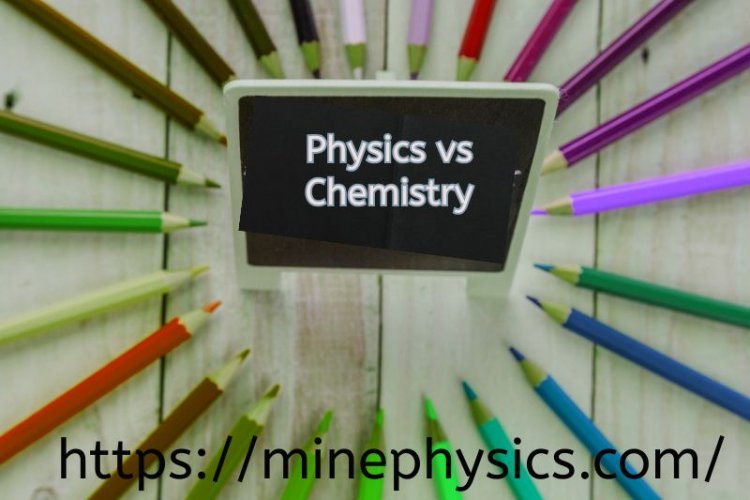Physics vs Chemistry: Two sides of a single coin?

Study Physics and Chemistry:
Science studies the world by observing, listening, and writing. There are several branches of science, two of which are physics and chemistry. Both branches are concerned with the study of the subject but differ in the way they study the subject and what they focus on. Anything with mass and space-occupying properties is considered matter. Physics focuses on how matter interacts while chemistry studies what matter is made of.
What is Physics?
It studies the interaction of matter. Physicists observe, experiment and collect data to find the physical laws that explain how everything in the universe behaves and works. Physics dates back to ancient Greek philosophy and was commonly known as "natural philosophy" until the late 18th century. In an effort to comprehend how the cosmos functions, several Greek philosophers, including Pythagoras, Plato, and Aristotle, developed ideas and laws. Most of these hypotheses and principles were derived from observation alone, not from calculations or scientific tests. Since that time, additional physicists have investigated the universe, using mathematics and experimentation to disprove accepted hypotheses and developing their own laws to account for what they saw. Famous physicists Sir Isaac Newton and Galileo made important contributions to our knowledge of the laws of motion, the functioning of gravity, and the motion of celestial bodies. Modern physics is said to have developed in the early 20th century when scientists such as Albert Einstein developed their theory of relativity and Bohr developed the atomic theory.
The ultimate goal of physics is to explain how everything in the universe works and interacts. Using mathematical laws, PHY tries to explain the entire universe in fundamental ways. There are two broad categories in physics: classical and modern. Classical Phy includes everything that was studied before the 20th century. This covers issues like force and motion, audio, astronomy, light, electricity, heat, and magnets, among others. Modern physics is concerned with the study of everything that has appeared since the early 20th century, mainly matter on a smaller scale and with more precise measurements. It covers subjects like atoms, lasers, astronomy, the origin of the cosmos, relativity, and nanotechnology.
What is Chemistry?
It is the study of how matter is made: its properties, its chemical composition, and how it reacts and changes. In the early days of CHEM, the focus was on practical applications, such as creating new things to improve life. Making soap, perfume, etc. It was the goal of chemists, not understanding what these substances and their properties are made of. Another early practice of chemistry was alchemy. People who practiced alchemy were called alchemists and believed that everything consisted of four elements: fire, water, air, and earth. By changing the relationship between these elements, it is possible to transform matter into something else. Alchemists used symbols to represent substances and kept their "knowledge" secret from the common people.
When Robert Boyle began his research in the 1600s, chemistry began to make great strides. He developed ideas about how gases behave and suggested that small particles could join together to form molecules. John Dalton used these ideas to develop his atomic theory in 1807. After Boyle pioneered, chemistry began to develop in leaps and bounds. After this, some notable chemists emerged. Mendeleev had a huge impact on the modern periodic table. Alfred Nobel invented dynamite and the Nobel Peace Prize was named after him. Louis Pasteur developed the process of sterilizing milk and wine using heat, which kills the micro-organisms present. The modern goal of chemistry is to study the composition of matter, to describe the state, structure, composition, and properties of matter, and to understand how it reacts and changes. Much of it is the study of atoms, how electrons are organized, and how that causes chemical reactions. As with physics, there are many areas of study in chemistry.
There are Five Main Areas:
1)Physical chemistry, which studies the atomic properties of matter.
2)Organic chemistry, the study of chemicals containing carbon and hydrogen. Most chemicals in all living organisms contain carbon.
3)Inorganic chemistry, which focuses on substances that do not contain carbon.
4)Analytical chemistry, which studies the structure of matter.
5)Studying the chemical reactions that occur within living things is known as biochemistry.
Conclusion:
Therefore, while the two disciplines undoubtedly differ in some theoretical and practical aspects, there are no clear boundaries between them. And as people living in a world governed by a scientific worldview, we should try to appreciate the interconnectedness of the sciences rather than widening the gap between them. Every scientific discipline, be it physics, chemistry, or whatever, reflects the beauty of nature; everyone is staring at it on different levels, from different points of view. While physics deals with the study of nature at its deepest level, often descending to unimaginably small scales in search of answers, chemistry studies the interactions of the constituents of matter on a larger scale. However, the reality involved is the same. So everyone can observe the beauty of nature in all its greatness from the point of view of any science. We just have to get far enough and enjoy the view.
What's Your Reaction?





















